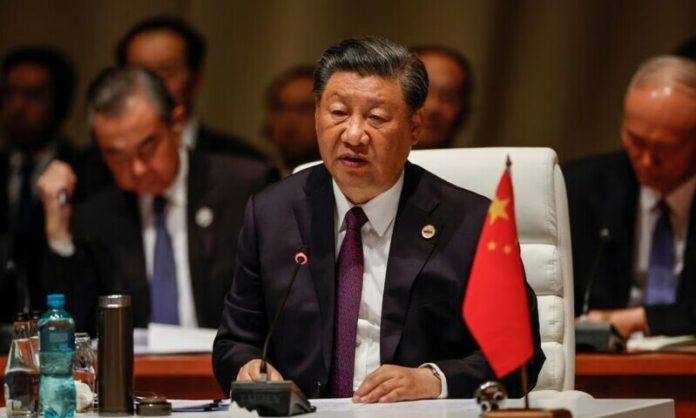Johannesbur: China’s President Xi Jinping called for unity among his BRICS counterparts at a summit in South Africa on Wednesday as he pushed the case for expanding the grouping to face a global “period of turbulence and transformation”.
Leaders of the bloc of leading developing nations Brazil, Russia, India, China and South Africa are meeting in Johannesburg with discussions around establishing a framework and criteria for admitting new members topping the agenda.
While all BRICS members have publicly expressed support for growing the bloc, divisions remain over how much and how quickly.
Bloc heavyweight China has long pushed for expansion and views its deteriorating relations with Washington as well as heightened global tensions resulting from the Ukraine war as adding urgency to the enlargement project.
Addressing the summit of the bloc’s leaders, Xi said he was glad to see that developing countries had shown great enthusiasm in participating in BRICS and many of them have applied to join.
“We should let more countries join the BRICS family to pool wisdom and efforts to make global governance more just and equitable,” Xi said.
Xi also said the BRICS countries have agreed to launch a study group on artificial intelligence (AI) and further expand cooperation on AI, including by strengthening information exchange and technical cooperation.
“The world is undergoing major shifts, division and regrouping … it has entered a new period of turbulence and transformation,” Xi said.
“We, the BRICS countries, should always bear in mind our founding purpose of strengthening ourselves through unity.”
BRICS group countries have economies that are vastly different in scale and governments that often seem to have few foreign policy goals in common, complicating decision-making.
The economy of China, for example, is more than 40 times larger than South Africa’s, Africa’s most developed country.
Russia, isolated by the United States and Europe over its invasion of Ukraine, is also pushing to quickly grow BRICS and forge it into a counterweight to the West.
Russian President Vladimir Putin, who is wanted under an international arrest warrant for alleged war crimes, sees BRICS membership as a way of showing the West he still has friends.
He did not travel to South Africa but used a video address to attack Western powers.
“I want to note that it was the desire to maintain their hegemony in the world, the desire of some countries to maintain this hegemony that led to the severe crisis in Ukraine,” he said.
South Africa’s President Cyril Ramaphosa said on Tuesday that he and Xi had similar positions on BRICS expansion.
But pushback has come from Brazil and India, which have both forged closer ties with the West.
Brazil’s President Luiz Inacio Lula da Silva on Tuesday rejected the idea the bloc should seek to rival the United States and the Group of Seven wealthy economies.
While he is pushing for neighbour Argentina to join, he said any new members would need to meet certain conditions, so the group does not become a “Tower of Babel”.
Indian Prime Minister Narendra Modi said on Wednesday his country, which is wary of Chinese dominance, fully supported expansion.
However, an Indian official familiar with discussions late on Tuesday between the leaders said Modi indicated “there have to be ground rules about how it should happen and who can join”.
India and China periodically clash over their disputed Himalayan border.
More than 40 countries have expressed interest in joining BRICS, say South African officials, 22 of whom have formally asked to be admitted.
Details of the criteria for joining could be included in a joint declaration due to be finalised on Wednesday.
Beyond the enlargement question, boosting the use of member states’ local currencies in trade and financial transactions to lessen dependency on the US dollar is also on the summit agenda.
South African organisers had said there would be no discussions of a common BRICS currency, an idea floated by Brazil as an alternative to dollar-dependence.
At least 15 potential new member countries — including Saudi Arabia, Algeria and Argentina — are under consideration to join the bloc’s New Development Bank (NDB), its chief financial officer said on Wednesday.
The NDB, which has long tapped China’s capital market for funding, is registering an Indian rupee bond programme worth $2.5 billion over five years after it issued its first South African rand bond last week. –Agencies




